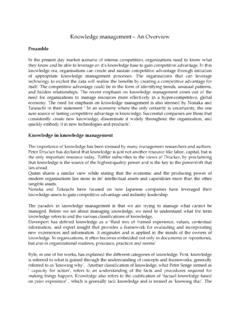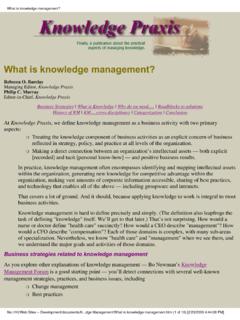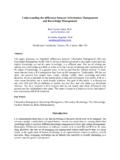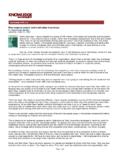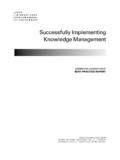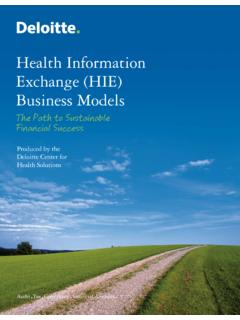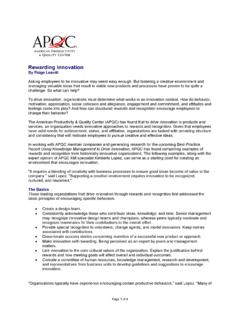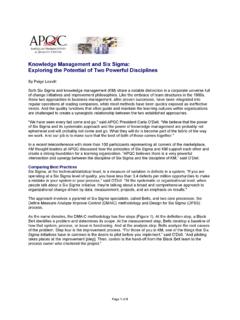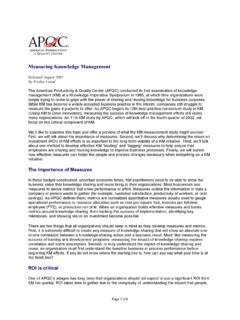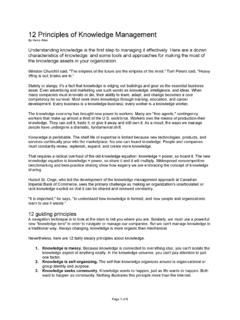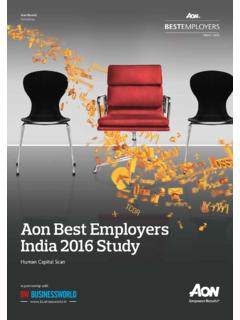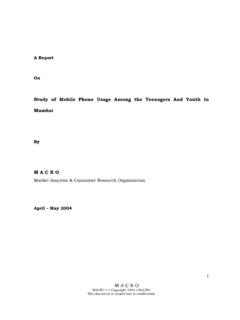Transcription of Applying Knowledge Management to Oil and Gas …
1 Applying Knowledge Management to Oil and Gas Industry Challenges Released October 2002 By Paige Leavitt (with contributions from Cynthia Raybourn and Cindy Hubert) The oil and gas industry has taken advantage of Knowledge Management (KM) developments for more than a decade. In that time, the industry has experienced rapid changes and so many mergers that a one-worded petroleum company name now seems like an oddity. Throughout the rapid advance of technology, an extension of offshore drilling, numerous acquisitions, the growing reliance on foreign oil sources, and a focus on environmental issues, KM initiatives have played a part in making operations more efficient and effective.
2 For instance, when oil and gas companies have been faced with new technology, outsourcing, new partnerships, and government regulation, their KM teams have provided support through technology and Knowledge transfer, as well as asset Management . When business issues involved capacity Management , cost reduction, and the environment, KM played a part through forecasting/scheduling and process and technique innovation. And to improve speed and convenience, KM initiatives have expanded to address point-of-sale technology adoption and procedure effectiveness. Undeniably, KM has been proven to increase stock market valuation, assist in growth through acquisition, lead to better-developed products, and encourage intelligent leadership for tenacious early adopters.
3 Chevron's (now ChevronTexaco's) definition of KM is apt for much of the industry: processes, tools, and behaviors that deliver the right content to the right people at the right time, and in the right context so they can make the best decisions, exploit business opportunities, and promote innovative ideas. Industry leaders, many of now merged companies, have embraced KM: "We learned that we could use Knowledge to drive learning and improvement in our company. We emphasize shopping for Knowledge outside our organization rather than trying to invent everything ourselves. Every day that a better idea goes unused is a lost opportunity.
4 We have to share more, and we have to share faster." - Ken Derr, Chevron "All companies face a common challenge: using Knowledge more effectively than their competitors do." - John Browne, BP Amoco " Knowledge Management is the framework for innovation to succeed in the new business while adapting employees to the rapidly changing operating environment." - Brendan O'Neill, Imperial Chemicals Industries "We got into KM because we had so many projects going on that it was difficult to standardize without limiting creativity.. Through KM, different leaders not only share experience and Knowledge , but go forward to create what I call 'contamination centers' where people infect each other with ideas.
5 " - Rudulfo Prieto, PDVSA "We must become experts in capturing Knowledge , integrating and preserving it, and then making what has been learned quickly and easily available to anyone who will be involved in the next business decision." - Baird, Schlumberger After so many years of experience, Knowledge Management may not be a novel concept. But an existing KM infrastructure can be a cost-effective means of addressing new and/or increasingly pertinent operational issues in the oil and gas industry, including retaining valuable Knowledge during a period of Page 1 of 6 work force aging/diminishing and increasing efficiency through communities of practice.
6 Furthermore, many companies are fine-tuning their best practices transfer process using content Management systems and communities of practice to further minimize downtime at field sites across the globe. Shifting Work Force and Preventing Corporate Amnesia In addition to numerous mergers and acquisitions, the industry has recently undergone significant turnover, internal redeployments, and growth-then-contraction fluctuations. All of this occurring in an industry in which an aging work force poses a threat to Knowledge retention. The Society for Petroleum Engineers (SPE) estimates that between 1980 and 1998 the number of people working in the oil and gas industry fell from about 700,000 to 300,000 people.
7 The median age of today's SPE members is 47. The industry will experience a 44 percent attrition rate among petroleum engineers by 2010, and 231,000 years of cumulative experience and Knowledge will be lost to the industry in the next 10 years due to retirement. Almost half of the work force will be new. Collectively, upstream oil and gas companies will likely lose more than 60 percent of all employees-along with their experience and Knowledge -by 2010 (Sapient Corporation. Brain Drain: Retaining Intellectual Capital in the Energy Industry. 2001). Through its recent KM consortium benchmarking study, APQC found that the best way to retain valuable Knowledge in the face of attrition or downsizing is to build and sustain systemic KM approaches.
8 Many best-practice organizations embed their Knowledge retention efforts in their overall KM strategy through: identifying and mapping the at-risk Knowledge loss, evaluating the risk, interviewing executives, employees or subject matter experts, conducting project reviews and After-Action Reviews, and establishing communities of practice. The most effective way to combat tomorrow's Knowledge loss is to capture, retain, and transfer valuable Knowledge in today's process and work flow, according to APQC's 2002 Best-Practice Report Retaining Valuable Knowledge : Proactive Strategies to Deal with a Shifting Work Force.
9 This not only retains the context, but also links the sources and co-creators of Knowledge while they are still present to learn from each other. Best-practice organizations often work closely with HR to design and implement Knowledge retention strategies, including hiring employees who will work effectively in a Knowledge -sharing environment. PanCanadian Petroleum Limited, a best-practice partner in APQC's 2001 study Succession Management : Identifying and Cultivating Tomorrow's Leaders, prepared to retain Knowledge using its HR programs. The general managers of business units or centers of excellence were responsible for their respective units and identified trends and future directions, development requirements and follow-up to make sure they occur, and continuity in succession planning and work force Management (forecasting).
10 IT also had a risk mitigation plan that managed talent discontinuity. Consequently, leaders knew where needs would arise before Knowledge retention became a problem. Minimizing Downtime The cornerstone of Knowledge Management is sharing best practices and lessons learned. Companies like Chevron Texaco, Schlumberger, and ExxonMobil have improved their efficiency by institutionalizing a Knowledge -sharing culture. But as these organizations collect large amounts of data, content accessibility and organization become pressing issues. The magnitude of content has increased dramatically, but the time to find and understand it has not.
